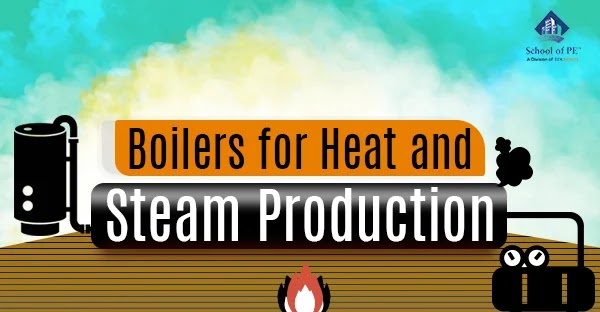Boilers for Heat and Steam Production in Mechanical and Industrial Engineering Applications
Oct 07, 2016Table of Contents
Introduction to Boilers: Definition and Usage (Mechanical or Industrial Applications)
Boilers are also known as steam generators; they are a closed vessel in which water is converted into steam through the application of heat. The steam is used for driving steam engines or steam turbines for power generation. The steam is also used for producing process steam, which is used for sizing and bleaching in the textile industry. The capacity of boilers used for power generation is considerably large compared with other boilers.

Boilers in Engineering Applications
Boilers are required to hold a certain quantity of water to generate and deliver the steam safely at the required temperature and pressure at the defined rate. Maximum heat produced by the fuel in the furnace should be utilized for engineering economics calculations. The boiler should be accessible for inspection and for further improvement. Mechanical or industrial engineers with their Professional Engineering exam certification are able to inspect and check quality control and quality assurance practices of the facility.
Different Types of Boilers Used for Various Engineering Applications
Boilers are classified according to the flow of water and hot gases.
Fire tube boilers: In fire tube boilers, hot gases pass through the tube, which is surrounded by water. There might be a single tube, as in the case of Lancashire boilers, or several tubes as in the case of Locomotive boilers.
Water tube boilers: With water tube boilers, water circulates through a large number of tubes, and hot gases pass around them. Babcock and Wilcox boilers are both water tube boilers.
Based on the location of the furnace, boilers are classified as externally or internally fired boilers.
- In internally fired boilers, the furnace is located as an integral part of the boiler structure.
- In the case of externally fired boilers, a separate furnace is built outside the boiler shell.
According to the application and position, boilers are classified as stationary or mobile:
- A stationary boiler is one which is installed permanently on the boiler foundation in any production or manufacturing unit.
- A mobile boiler is used for ocean cargo and passenger ships with an inherent fast navigation capacity.
Difference Between Fire Tube and Water Tube Boilers
Fire tube boilers are simple, vertical type boilers; they are the simplest form of internally fired boilers. Fire tube boilers do not require a heavy foundation, and they require minimum area. In water tube boilers, water is circulated inside the tubes, and hot gas flows over the tubes. The system requires a considerable amount of area for installation. Thermal and fluid systems of mechanical engineering in PE exam review courses will describe various types of boilers and functionality differences.
Advantages and Disadvantages of Water Tube Boilers
- Steam can be generated at a very high pressure in water tube boilers.
- Steam can be raised at a quicker rate with large water capacity
- The hot gases flow toward the direction of water flow, so the maximum amount of heat is transferred to the water
- Bursting of one or two tubes does not greatly affect the boiler, so water tube boilers are sometimes known as safety boilers
- The different parts of water tube boilers can be separated so it is easier to transport and is also suitable for use in steam power plants
- Water tube boilers are less suitable for hard water because a small deposit of scale may cause overheating and bursting of tubes. Thus, the water treatment plant is very essential for water tube boiler consumption.
- High operating and maintenance costs
- A delay in water supply, even for a short period, will likely make the boiler overheated. Water level must be watched very carefully during the operation.
Professional mechanical engineers with their PE exam certification will be aware of all engineering applications of boilers and their capacity to generate steam.
Latest Blogs
Blogs by Year/ Month
Copied to clipboard



